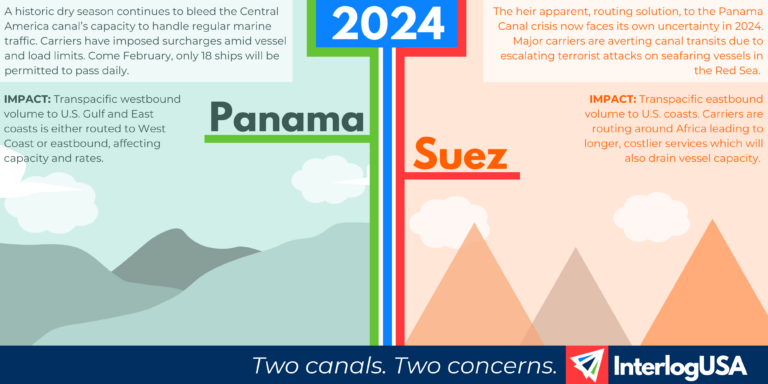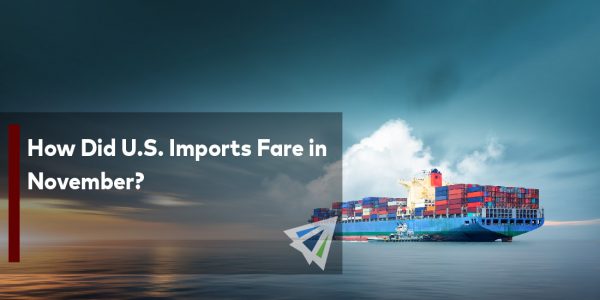Competitive Edge
December 20th, 2023
Stay Current with InterlogUSA
Latest Industry Happenings and Market Updates:

UPDATE: Red Sea hostility leads to Suez Canal uncertainty
Just as the Suez captured the intrigue from stakeholders as a competitive alternative to its drought-struck contemporary, the canal now faces its own crisis of sorts. The Houthis, Yemen rebel militants, have been attacking cargo ships transiting through the Red Sea—the body of water south of the Suez.
While the militant group states that its targeting vessels with links to Israel, attacks on non-Israel fleet, like Hong Kong-based carrier OOCL, have proven otherwise. The number of ocean carriers refusing to risk Red Sea transits is growing by the day.
The world’s largest carriers Maersk, MSC, Hapag-Lloyd, CMA CGM, Evergreen, Yang Ming, Cosco, OOCL, HMM, and ONE have paused Red Sea transits opting to reroute around Africa’s Cape of Good Hope. The change in routing adds considerable transit time.
Longer voyages will require additional vessel capacity from carriers if they intend on maintaining their typical weekly services from Asia to Europe and the U.S. This will likely lead to an initial capacity crunch and an increase in container shipping rates.
Oil and gas companies, tankers, and car carriers are also rerouting away from the canal.
For more analysis on the Suez Canal, Red Sea attacks, and the impacts on U.S. shippers, sign-up for Interlog Insights.
IMPORT: Asia to North America (TPEB)
Recent Developments:
- Major carriers have announced general rate increases (GRIs) on North American imports from India beginning in January.
Rates: Rates remain level, however they could rise in the coming weeks as longer transits (from canal uncertainty) leads to increased shipping demand measured in ton-miles (volume multiplied by distance).
Space: Space is generally open, but certain services have seen tightening.
Capacity: Longer transits averting the canals will absorb vessel capacity in order to maintain weekly services.
Equipment: There are no outstanding equipment deficits or bottlenecks.
TIPS:
- Hold your logistics partners accountable for frequent updates regarding current market conditions and routing impacts.
- Establish a firm timeline for future import activity.
IMPORT: Europe to North America (TAWB)
Recent Developments:
- Carbon-related surcharges have been announced by ocean carriers ahead of the shipping industry’s indoctrination to the EU emissions trading system in January. For more information.
Rates: Rates have receded to lower levels after an abrupt increase late last month.
Space: Space is open.
Capacity: Capacity remains plentiful. No major adjustments from carriers, yet.
Equipment: Availability on both origin and destination sides, unless advised otherwise.
TIPS:
- Book at least three weeks prior to the ready date.
- Carriers have yet to take aggressive action, like they have in the Pacific, regarding capacity management. However, this trade is not profitable for them in its current state, so be on the lookout as they may become more emboldened.
EXPORT: North America to Asia
Recent Developments:
- The U.S. is on pace to be the world’s largest producer and exporter of natural gas this year.
Rates: After sliding through October, outbound rates have levelled off—remaining relatively low.
Capacity: Schedule reliability can be fickle in pockets.
Equipment: Rail car availability issues have softened.
TIPS:
- Insufficient communication with sailing schedules can lead to higher detention and demurrage fees as well as higher trucking and storage costs. Ensure your logistics partners are not keeping you and your cargo in the dark.
Watch Today's Webinar!
TOPICS: Our experts discussed updates on Panama Canal, Red Sea disruptions, Chinese New Year prep, and 2023 import volumes.
Sign Up For Our January Webinar!
Our next webinar is Wednesday, January 17th, at 10am CST!
We will be announcing topics in the next couple of weeks.
If you have any topic suggestions or questions for our experts..
please reach out to us at [email protected]
What is Coffee & Cargo? Every month, our experts sit down to discuss what’s currently happening in the shipping industry. Every so often we are joined by special guests, who share their specific expertise and experiences.
Freight News
Nestlé Continues Their Quest in Cutting Ocean Transport Emissions
In a December 6th press release, Nestlé announced that in 2023 and potentially into next year, half of their global shipments will be shipped via Maersk, CMA CGM or Hapag-Lloyd, who are all planning to reduce freight emissions.
“The agreements we’ve signed with our shipping partners will help us cut emissions and immediately reduce our carbon footprint. We know this is an interim solution and continue to encourage the development of longer term decarbonization solutions in shipping and distribution,” says Stephanie Hart, Executive Vice President and Head of Operations at Nestlé.
Nestlé hopes to reduce its annual greenhouse gas emissions from shipping by around 200,000 metric tons of CO2 equivalent.
European Union's ETS Starts Being Applied to Shipping January 1st, 2024
In two weeks, European Union’s emission trading system (ETS) will start to be applied to the shipping industry.
The timeline:
Starting January 1st, the EU ETS will begin a phased-out implementation process. According to Clyde & Co., this involves 2024 stakeholders to buy and surrender allowances for 40 percent of their verified emissions for intra-EU voyages, and 20 percent of their emissions for voyages into or out of the EU.
In 2025, this will increase by 70% of emissions for intra-EU voyages.
In 2026, this will increase by 100% of emissions for intra-EU voyages and 50% for voyages into or out of the EU.
Additionally, by September 30th of every year, shipping companies must surrender their allowances from the previous year under the EU ETS, per Clyde & Co’s. report.
ETS surcharges have varied among carriers, which has some industry stakeholders having more questions than answers, which will hopefully happen sooner than later.
We wrote a blog on this topic, feel free to check it out here.
A Podcast by InterlogUSA: NEW FreightFM Episode
Check out episode 13: “Tis the Season: Holiday Trucking and Consumer Spending!”
Interlog’s Emily Smith, Harry Lien and Owen Campbell sit down and discuss consumer spending and trucking conditions ahead of the uncertain holiday season!
FreightFM features short-form video interviews with Interlog’s industry experts offering insights into breaking news, market trends, our company’s history, and more!
Interlog  Insights
Insights
In last week’s insights we discuss how the Suez Canal is facing uncertainty and potential re-routing options for shippers.
We also discussed holiday travel predictions.
Sign up for our
industry answers
Our team works to provide valuable, unique, and relevant content to assist you in finding solutions. Sign up now.

